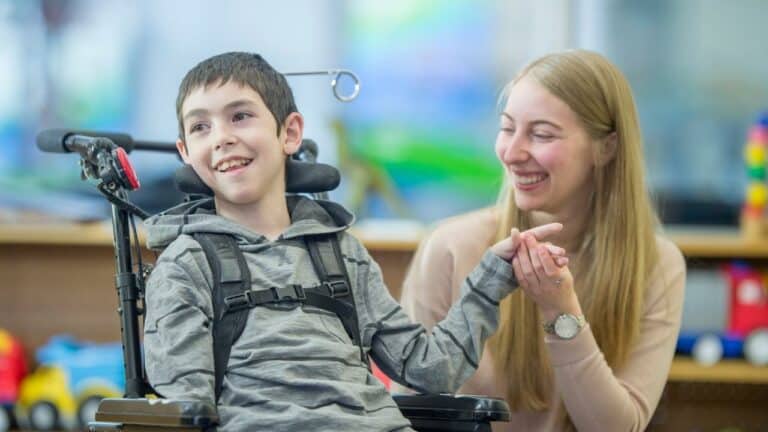Benefits of a Healthcare Background for Live-in Caregivers
When it comes to finding the right live-in child care provider for your family, there are important factors to think about. Having a Care Professional with a healthcare background can be really helpful for families with a child who has special needs. These caregivers go through thorough training in taking care of people and medical procedures. This makes them well-prepared to offer special care and support for children with unique needs.
One big advantage of having a live-in child care provider with this background is the specialized care they can provide. Children with special needs often need help with activities of daily living, like moving around, personal hygiene, and eating. Caregivers with healthcare training, like CNAs, have the know-how to give customized care based on the specific needs of the child, making sure they are well and comfortable.
Their medical training is another important part. They are skilled in basic medical tasks such as checking vital signs, giving first aid, and helping with medical tools. For families with a child facing ongoing health problems or needing regular medical interventions, having someone with a healthcare background ensures a special level of awareness. Even though they’re not doing tasks that demand certification or a license in the home, their knowledge promotes a different level of understanding while providing care for your child.
Having them around also brings a sense of safety and readiness for emergencies. They are trained to handle emergencies calmly and effectively, which is especially comforting for families with children who have complicated medical conditions. Knowing that there is someone knowledgeable and capable of dealing with unexpected medical situations as a child care provider can reduce stress and worry for the family.
They can also play a big role in supporting therapeutic activities and exercises for children with special needs. Many of these children need regular therapy to improve their physical and cognitive abilities. If their child care provider has a medical background, they are better able to help with the child’s therapy exercises during the week.
Besides physical care, child care providers with medical training, like CNA certification or pediatric healthcare, are trained to notice and record changes in health conditions. This skill is really important for children with special needs as it allows caregivers to keep an eye on their health regularly. Finding and dealing with health issues early can lead to better health outcomes for the child.
Another advantage is their ability to find the right balance between offering support and encouraging independence. They are good at helping individuals with everyday activities while also letting them do things on their own. For children with special needs, developing independence is important for their growth, and caregivers with a healthcare background can help with that.
In conclusion, having a live-in Care Professional with a healthcare background can be a big help for families with a child who has special needs. The special care, medical training, consistent care, and support for therapy and exercises they provide can really improve the child’s overall well-being and development. Having such a skilled and caring person in the household can give peace of mind to the family and ensure the child gets the best care and support possible.
Childcare with a healthcare degree from Germany

Nurse (Pflegefachfrau/mann)
You can expect a Care Professional with this background to have had 3 years of vocational training or a 4 year Bachelor’s Degree.
- Generalized Nurse - training in all areas of care.
- Pediatric Nurse - specialized in the care of infants, including newborns, premature babies, multiples and infants with special needs with practical training in hospital maternity wards, nurseries or in neonatal intensive care units.

Special Needs Care Provider (Heilerziehungspfleger)
You can expect a Care Professional with this background to have had 3 years of vocational training or a 4 year Bachelor’s Degree in assisting, caring, educating and helping children and adults with special care requirements. They provide personal and hygiene assistance including toileting, bathing, lifting, feeding and other daily support needs. Care Professionals with this educational background are usually employed in a variety of places such as residential homes or communities, preventive or rehabilitation clinics, or social facilities. In the field of education as well as child and youth work. They can also work in home, daycare or school settings.
Theoretical training; 2,100 hours. Practical training 2,500 hours.
Childcare with healthcare experience from the United States:

CNA (Certified Nursing Assistant)
A CNA provides for activities of daily living by assisting with serving meals, feeding patients as necessary and ambulating, turning, and positioning patients; ensuring food and liquid intake.
Degree: Requirements to become a CNA is a high school diploma, completing a state-approved CNA training program and to pass a state-approved competency exam.

Direct Support Professionals (DSP)
DSP’s are people who work directly with people with physical disabilities, intellectual disabilities, or developmental disabilities with the aim of assisting the individual to become integrated into his/her community or the least restrictive environment.
Degree: In many cases, a high school diploma or equivalent is the minimum educational requirement to work as a DSP. Having a strong educational foundation is essential for this role. Many DSPs receive on-the-job training from their employers to learn about the specific needs of the individuals they will be supporting, as well as the organization's policies and procedures.
Duration: Can range from a few weeks to several months.
